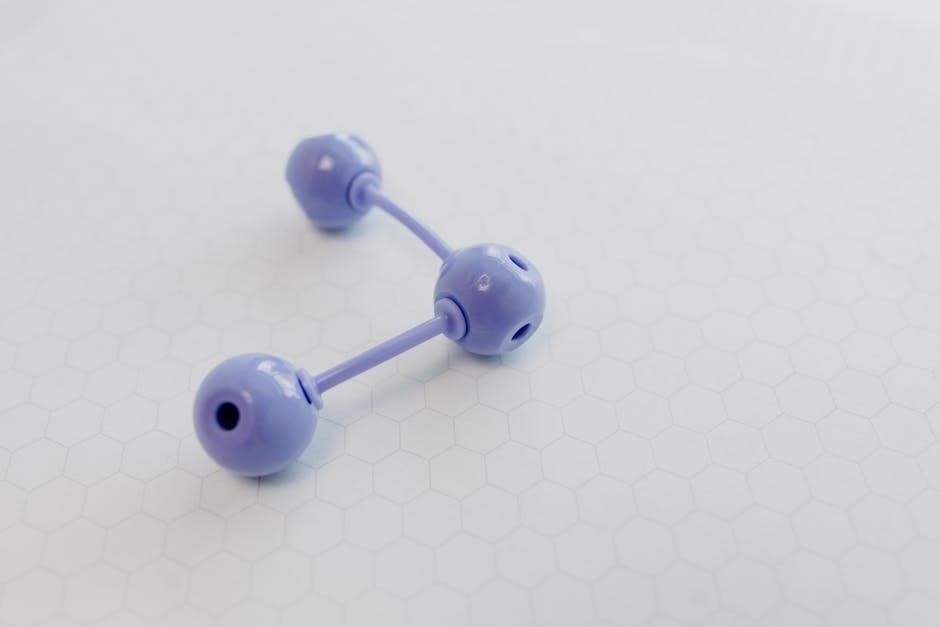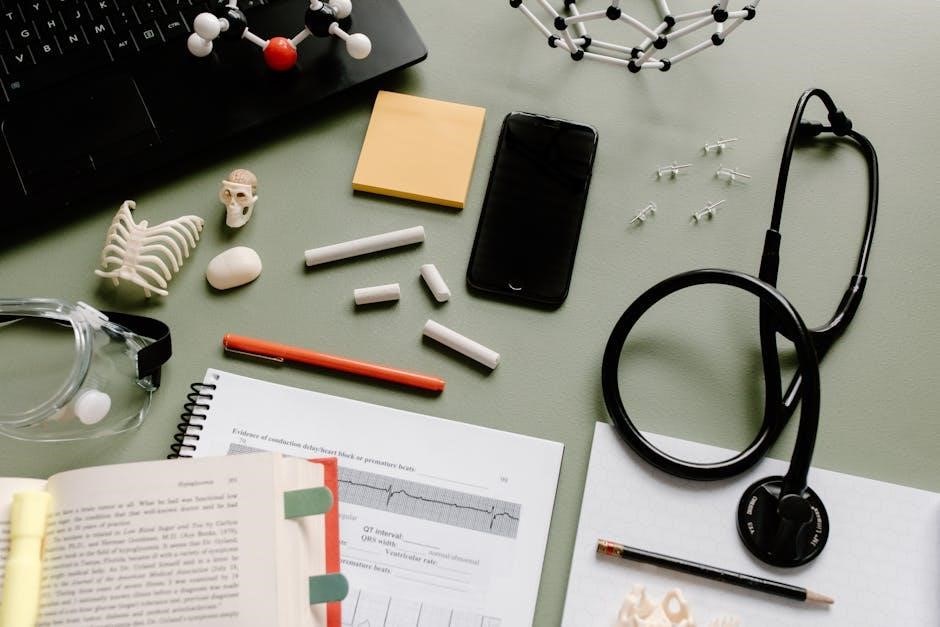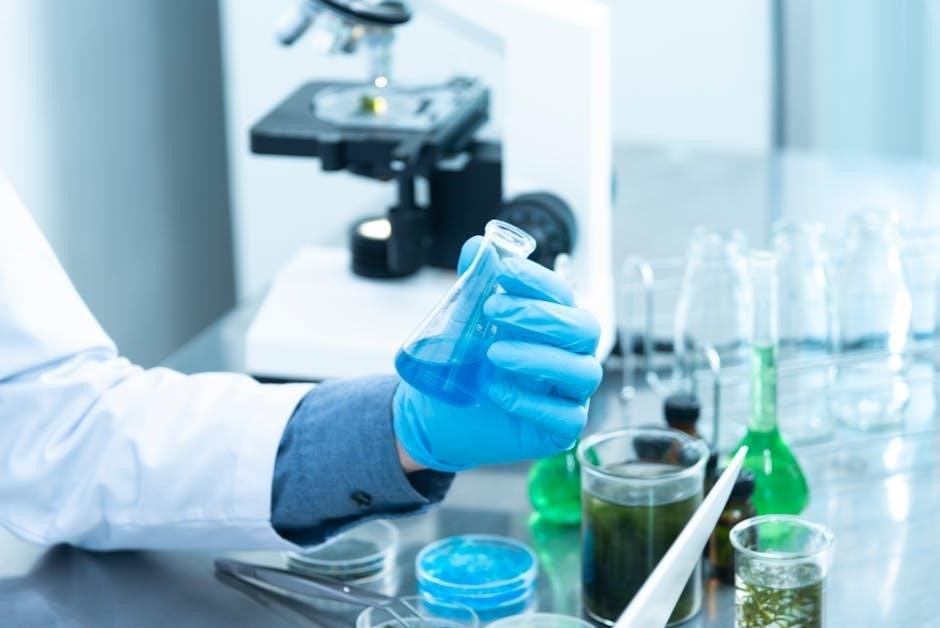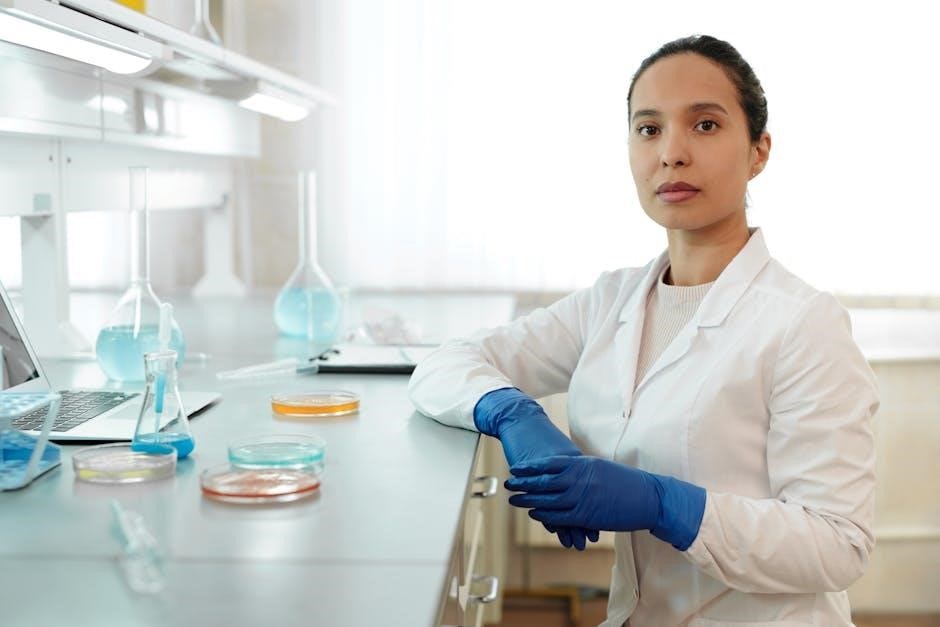
The TEAS 7 Science Study Guide is a comprehensive resource for nursing students, covering biology, chemistry, and physics. It includes practice tests and expert tips to help students master key science concepts, ensuring they are well-prepared for the exam. Designed to simplify complex topics, this guide is an essential tool for achieving success on the TEAS 7 exam.
Overview of the TEAS 7 Exam
The TEAS 7 exam assesses essential skills in reading, mathematics, science, and English language usage. It is a multiple-choice test with 150 questions, divided into four sections: biology, chemistry, physics, and general science. The exam evaluates critical thinking and problem-solving abilities, with a focus on scientific concepts and their practical applications. Designed for nursing and allied health program admissions, the TEAS 7 requires thorough preparation. A study guide is crucial for understanding the exam format, question types, and content emphasis, ensuring candidates are well-equipped for success.
Importance of Science in the TEAS 7 Exam
Science constitutes a significant portion of the TEAS 7 exam, with questions covering biology, chemistry, and physics. It tests foundational knowledge and the ability to apply scientific principles to real-world scenarios. Nursing professionals must grasp these concepts to provide effective patient care. A strong science background ensures understanding of human anatomy, disease processes, and treatment protocols. Thus, focusing on science is crucial for achieving a high score and securing admission to competitive healthcare programs. A study guide helps in systematically reviewing and mastering these essential scientific topics.

Biology Section of the TEAS 7
The biology section of the TEAS 7 focuses on anatomy, physiology, genetics, and cellular processes. It assesses knowledge of human body systems and biological principles.
Key Concepts in Anatomy and Physiology
The TEAS 7 science section emphasizes understanding human anatomy and physiology, focusing on major body systems such as the digestive, respiratory, and circulatory systems. Key topics include cell structure, tissue types, and organ functions. Students should grasp how systems interact to maintain homeostasis and overall health. Concepts like blood circulation, gas exchange, and nutrient absorption are critical. Additionally, understanding the nervous and musculoskeletal systems is essential. Mastery of these areas ensures a strong foundation for nursing-related questions in the exam.

Genetics and Evolutionary Principles
Genetics and evolutionary principles are crucial for understanding heredity and biological diversity. Key concepts include DNA structure, Mendelian inheritance, and Punnett squares for predicting genetic traits. Students should grasp how genetic mutations and natural selection drive evolutionary changes. Topics also cover population genetics, speciation, and the role of environmental factors in shaping species. Understanding these principles helps in analyzing genetic disorders and their implications. The TEAS 7 science section tests the ability to apply genetic concepts to real-world scenarios, making it vital for nursing professionals to comprehend these fundamental biological processes.
Chemistry and Physics Section
The Chemistry and Physics section covers foundational concepts like chemical reactions, atomic structure, and basic physics principles. It emphasizes understanding matter properties and energy interactions, crucial for nursing applications.
Basic Chemical Principles and Reactions
Mastering basic chemical principles is essential for understanding biological processes. Key topics include atomic structure, chemical bonding, and reactions. Students learn about acids, bases, and pH scales, which are critical for comprehension of bodily functions. The section also covers stoichiometry, solubility, and chemical equilibrium, providing a foundation for nursing applications. Practice tests and free PDF guides, like the TEAS 7 Science Study Guide, offer detailed explanations to help students grasp these concepts. Regular practice ensures familiarity with reaction types and their relevance to healthcare scenarios, making this section vital for exam success.
Physics Fundamentals Relevant to Nursing
Physics fundamentals in the TEAS 7 exam focus on concepts like motion, forces, and energy, which are crucial for understanding medical equipment and patient care. Topics include mechanics, thermodynamics, and fluid dynamics, applying to real-world scenarios such as patient mobility and oxygen delivery. Nursing students must grasp these principles to comprehend medical imaging and therapeutic technologies. Free study guides and practice tests, such as the TEAS 7 Science Study Guide PDF, provide detailed explanations and questions to help master these concepts, ensuring practical application in healthcare settings and improving problem-solving skills for nursing professionals.

Study Strategies for Success
Effective study strategies include setting clear goals, utilizing active learning techniques, and leveraging free resources like the TEAS 7 Science Study Guide PDF for structured exam preparation.
Effective Time Management for Exam Preparation
Effective time management is crucial for successful TEAS 7 exam preparation. Create a structured study schedule, allocating specific time slots for each science topic. Prioritize challenging areas and use the TEAS 7 Science Study Guide PDF to focus on key concepts. Incorporate regular practice tests to assess progress and identify weak spots. Dedicate time for review sessions to reinforce learning. Avoid cramming by breaking study sessions into manageable intervals, ensuring a balance between preparation and rest. Consistency and organization are key to mastering the material efficiently;
Utilizing Practice Tests for Better Understanding
Practice tests are a vital tool for mastering the TEAS 7 Science exam. They simulate real exam conditions, helping you assess your knowledge and identify weak areas. Regularly taking practice tests allows you to track progress and refine your strategies. Many free TEAS 7 Science study guides offer practice questions, covering topics like biology, chemistry, and physics. Use these resources to familiarize yourself with question formats and timing; Reviewing answers and explanations enhances understanding and improves problem-solving skills, ensuring a stronger grasp of essential concepts for exam success.
Common Mistakes to Avoid
Common mistakes include poor time management, neglecting basic concepts, and not reviewing practice test explanations. Address these to enhance your TEAS 7 Science exam performance effectively.
Understanding Question Types and Formats
Familiarizing yourself with TEAS 7 question types—such as multiple-choice, fill-in-the-blank, and short-answer—helps reduce confusion. Many questions incorporate visual elements like charts or diagrams, requiring careful analysis. Practice tests reveal common question patterns, aiding in targeted preparation. Understanding the format ensures you manage time efficiently and avoid errors. Focus on skimming questions quickly while absorbing key details. This strategy enhances accuracy and confidence, crucial for tackling the exam effectively. Regular practice with diverse question types strengthens your ability to approach them systematically and calmly during the test.
Strategies to Improve Weak Areas
Identify your weak areas through diagnostic tests and focus on those topics. Use flashcards to reinforce memory of key terms and concepts. Break down complex subjects into smaller, manageable sections for easier understanding. Regularly review and practice problems related to your weaker areas to build confidence. Seek additional resources, such as free study guides or online tutorials, to supplement your learning. Consistent practice and targeted study plans are essential for overcoming challenges and achieving improvement in science subjects on the TEAS 7 exam.
Free Resources for TEAS 7 Preparation

Access free TEAS 7 study guides, practice tests, and flashcards online. Websites like Docsity offer downloadable PDF materials, while community forums provide valuable support and tips for success.
Top Websites for Free Study Materials

Several websites offer free TEAS 7 study materials, including Docsity, which provides downloadable PDF guides and practice tests. Southside.edu features diagnostic tests and preparation resources; Additionally, ATI’s official website offers a free TEAS Science practice test accessible via a QR code. These platforms are invaluable for students seeking cost-effective ways to prepare for the exam. Utilizing these resources ensures access to high-quality study aids without additional expenses, helping candidates achieve their goals efficiently.
Benefits of Community and Forums for Learning
Engaging with online communities and forums provides valuable support for TEAS 7 preparation. These platforms allow students to share resources, discuss challenging topics, and gain insights from peers. Forums like Docsity and nursing-focused groups offer access to shared study materials, including free PDF guides and practice tests. Additionally, interactive discussions help clarify doubts and provide motivation. Participating in these communities fosters a collaborative learning environment, enabling students to stay updated on the latest study strategies and resources, ultimately enhancing their exam readiness and confidence.

Diagnostic Tests and Progress Tracking
Diagnostic tests help identify strengths and weaknesses, guiding study plans. Free TEAS 7 science PDF guides and online resources provide tools for self-assessment and improvement tracking.
How to Use Diagnostic Tests Effectively
Start by taking a diagnostic test to assess your current knowledge level. Identify areas where you need improvement and focus your study efforts there. Use the results to create a personalized study plan, prioritizing weak areas. Regularly retake diagnostic tests to track progress and adjust your strategy as needed. This method ensures efficient use of study time and helps build confidence for the actual TEAS 7 exam. Consistent practice and analysis are key to achieving optimal results.
Monitoring Progress and Adjusting Study Plans
Regularly monitor your progress by tracking scores from practice tests and identifying areas of improvement. Set specific milestones and adjust your study schedule based on performance. Analyze test results to pinpoint strengths and weaknesses, focusing extra time on challenging topics. Use the insights gained to refine your study plan, ensuring a balanced approach to all sections of the TEAS 7 exam. Adjusting your strategy based on progress helps maximize efficiency and ensures steady improvement over time. Stay flexible and committed to your goals for optimal results.

Final Exam Preparation Tips
Ensure a restful night’s sleep before the exam and maintain a healthy diet. Arrive early to the test center, stay calm, and systematically approach each question. Use time management skills and read instructions carefully. Avoid guessing; skip difficult questions and return to them later. Stay hydrated and keep a positive mindset to optimize performance. Trust your preparation and remain focused throughout the exam for the best results.
Test-Day Strategies for Optimal Performance
Achieve peak performance on exam day by arriving early, staying calm, and systematically tackling questions. Prioritize understanding instructions and managing time effectively. Skip challenging questions initially, marking them for later review. Avoid guessing to minimize errors. Utilize free TEAS 7 science study guides and practice tests to refine strategies. Stay hydrated, maintain a positive mindset, and trust your preparation. Approach each question methodically, eliminating incorrect options before selecting the best answer. Focus on high-probability questions first to secure foundational points. By staying composed and strategic, you can maximize your score and achieve success.
Mental and Physical Readiness for the Exam
Mental and physical readiness are crucial for optimal performance on the TEAS 7 exam. Ensure adequate sleep and nutrition in the days leading up to the test. Engage in relaxation techniques such as deep breathing or meditation to reduce stress. Stay hydrated and maintain energy levels with balanced meals. Mentally prepare by visualizing success and reinforcing confidence in your abilities. Avoid cramming and instead review concepts lightly to prevent burnout. A healthy body and mind will enhance focus, ensuring you approach the exam with clarity and determination for the best possible outcome.